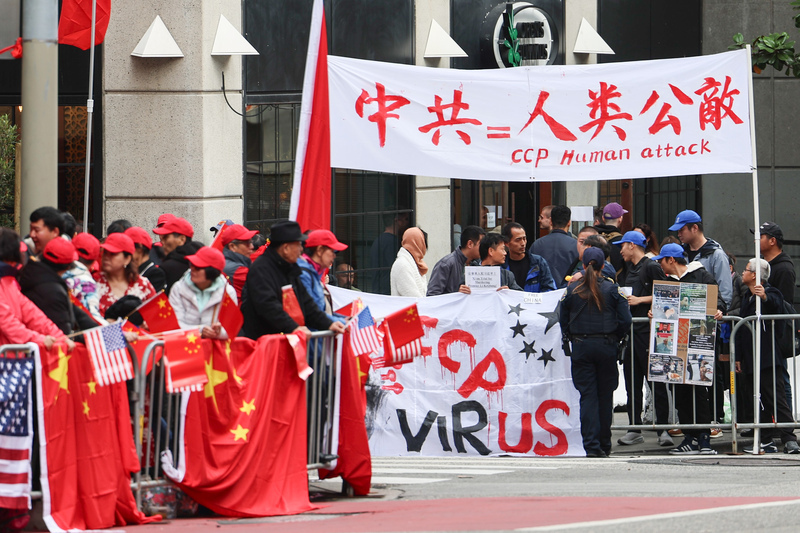报告员:王栋
日期: 2023年11月13日
地点: 旧金山
背景
2023年11月13日,中国国家主席习近平访问旧金山,出席亚太经济合作组织(APEC)领导人会议。这是近年来中国国家领导人首次出访美国西海岸,旨在加强中国与亚太地区国家的经济合作和交流。此次会议受到全球瞩目,然而,会议期间也爆发了关于中国国内人权问题的抗议活动。
抗议活动
在习近平访问期间,旧金山多个地区爆发了抗议活动,抗议者主要集中在中国国内人权状况,特别是对言论自由、宗教自由和少数民族权益的压制。抗议者包括华人社区成员、国际人权组织代表以及关注中国问题的美国市民。他们举着标语,呼喊口号,要求中国政府停止对异见人士的镇压,释放政治犯。
中国政府的应对
据报道,中国政府对这些抗议活动进行了严格监控和干预。以下是中国政府采取的一些措施:
- 加强安全措施: 中国驻旧金山总领事馆和APEC会议场所周边的安保措施显著加强,大量警力部署,确保会议期间的秩序。
- 信息控制: 中国政府通过各种渠道,试图控制和限制国内媒体对抗议活动的报道。中国境内的社交媒体平台上,对相关内容的搜索和讨论被严格审查和删除。
- 外交施压: 中国政府通过外交途径,向美国政府施加压力,要求其限制抗议活动,确保会议顺利进行。
国际反应
此次中国政府在习近平访问旧金山期间的镇压抗议活动,引发了国际社会的广泛关注和谴责。多个人权组织发表声明,谴责中国政府对言论自由和集会自由的压制行为。美国政府也对中国的举动表示关切,重申了对基本人权的支持立场。
结论
习近平访问旧金山出席APEC会议期间,中国政府对抗议活动的镇压行为,再次引发了国际社会对中国人权状况的关注。尽管中国政府在经济领域寻求更广泛的国际合作,但其在人权问题上的态度和行为,仍然是国际社会关注的焦点。此次事件显示出,在全球化的背景下,国家之间的经济合作与人权问题的复杂交织,仍将继续影响国际关系的发展。
此次事件为各国政府、国际组织以及公众提供了一个重要的反思机会,即在追求经济利益的同时,如何更有效地促进和保护人权,确保每个人的基本自由和尊严得到尊重。
Report: Chinese Communist Party Suppresses Protesters During Xi Jinping's Visit to San Francisco for the APEC Meeting
Date: November 13, 2023
Location: San Francisco
Background
On November 13, 2023, Chinese President Xi Jinping visited San Francisco to attend the Asia-Pacific Economic Cooperation (APEC) Leaders' Meeting. This marked the first visit by a Chinese state leader to the West Coast of the United States in recent years, aimed at strengthening economic cooperation and exchanges between China and the Asia-Pacific region. The meeting garnered global attention; however, it was also marred by protests concerning China's domestic human rights issues.
Protest Activities
During Xi Jinping's visit, multiple protests erupted across San Francisco. The protesters focused primarily on human rights conditions within China, particularly the suppression of freedom of speech, religious freedom, and the rights of ethnic minorities. The protesters included members of the Chinese community, representatives of international human rights organizations, and American citizens concerned with issues in China. They carried banners and chanted slogans, demanding the Chinese government cease its repression of dissidents and release political prisoners.
Response from the Chinese Government
Reportedly, the Chinese government closely monitored and intervened in these protests. The following measures were taken by the Chinese authorities:
- Enhanced Security Measures: Security around the Chinese Consulate in San Francisco and the APEC meeting venues was significantly tightened, with a substantial police presence to ensure order during the meetings.
- Information Control: The Chinese government attempted to control and limit domestic media coverage of the protests through various channels. Discussions and searches related to the protests were strictly censored and removed from social media platforms within China.
- Diplomatic Pressure: The Chinese government exerted diplomatic pressure on the U.S. government, requesting it to limit the protests and ensure the smooth conduct of the meeting.
International Reaction
The Chinese government's suppression of protests during Xi Jinping's visit to San Francisco drew widespread attention and condemnation from the international community. Several human rights organizations issued statements denouncing China's actions against freedom of speech and assembly. The U.S. government also expressed concern over China's actions, reaffirming its support for fundamental human rights.
Conclusion
The suppression of protests by the Chinese government during Xi Jinping's visit to San Francisco for the APEC meeting once again highlighted international concerns over China's human rights record. While the Chinese government seeks broader international cooperation in the economic realm, its stance and actions on human rights remain a focal point for global scrutiny. This event underscores the complex interplay between economic cooperation and human rights issues in international relations.
This incident provides an important opportunity for governments, international organizations, and the public to reflect on how to more effectively promote and protect human rights while pursuing economic interests, ensuring that the fundamental freedoms and dignity of every individual are respected.









